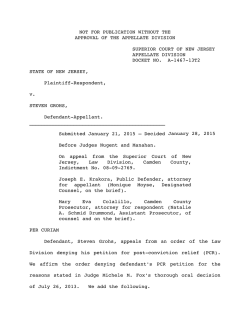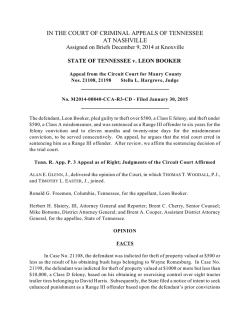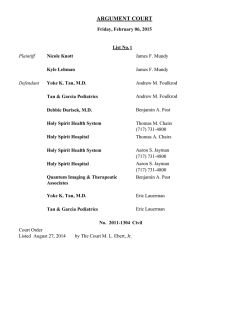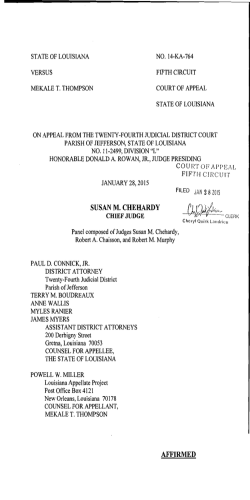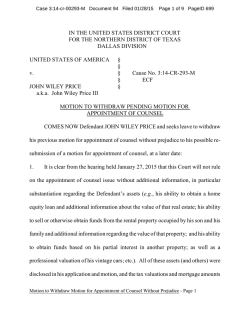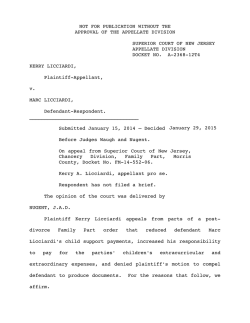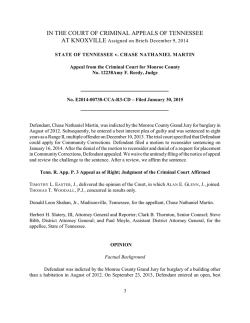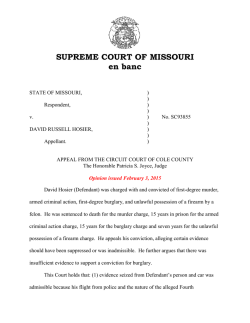
State of Tennessee v. David Wortman
IN THE COURT OF CRIMINAL APPEALS OF TENNESSEE AT KNOXVILLE Assigned on Briefs December 9, 2014 STATE OF TENNESSEE v. DAVID WORTMAN Appeal from the Criminal Court for Sullivan County No. S61267 R. Jerry Beck, Judge ___________________________ No. E2014-00913-CCA-R3-CD - Filed January 29, 2015 ____________________________ Defendant, David Wortman, pled guilty to two counts of aggravated assault and one count of possession of a firearm by a convicted felon in exchange for an effective sentence of four years and six months, with the manner of service of the sentence to be determined by the trial court at a sentencing hearing. After the sentencing hearing, the trial court denied alternative sentencing, ordering Defendant to serve his sentence in incarceration. Defendant appeals the denial of alternative sentencing. Because the trial court did not abuse its discretion in denying alternative sentencing, we affirm the judgments of the trial court. Tenn. R. App. P. 3 Appeal as of Right; Judgments of the Criminal Court Affirmed T IMOTHY L. E ASTER, J., delivered the opinion of the Court, in which T HOMAS T. W OODALL, P.J., and A LAN E. G LENN, J., joined. Randall D. Fleming, Kingsport, Tennessee, for the appellant, David Wortman. Herbert H. Slatery, III, Attorney General and Reporter; Clark B. Thornton, Senior Counsel; Barry P. Staubus, District Attorney General; and Joshua Parsons, Assistant District Attorney General, for the appellee, State of Tennessee. OPINION Factual Background Defendant was indicted in September of 2012 for two counts of aggravated assault and one count of possession of a firearm by a convicted felon. In May of 2014, Defendant entered guilty pleas to the offenses as listed in the indictment in exchange for a sentence of four years and six months for each aggravated assault conviction and a sentence of one year for the conviction of possession of a firearm by a convicted felon. The manner of service of the sentence was to be determined by the trial court. At the guilty plea hearing, the parties stipulated to the affidavit of complaint as the factual basis for the plea. It reads as follows: 02-05-2012 Deputies responded to a reported domestic [disturbance] at 201 Old Weaver Pike in Bristol, T[ennessee]. Upon arrival deputies met with [Defendant and] Nora Reynolds who were standing outside the trailer. Jacky Reynolds [Victim in count 1], Michelle Trivett, [Victim in count 2] and her daughter Holly Widner were inside the residence. Jacky Reynolds stated that he started receiving text[] messages from his wife around 1100 on this day. He stated his wife, Nora Reynolds, has not been living with him at this address for some time. He told deputies a fight ensued when Nora arrived and an unknown male shot a pistol into the ceiling of the trailer and then pointed it at him and his girlfriend, Michelle Trivett. During the investigation I learned from Jacky Reynolds that his wife, Nora, had called him and told him there was going to be trouble and she was coming up to the residence. He stated she was mad because she found out he was dating her niece, Michelle Trivett. At 1318 he received a text from Nora. In the text she made threats of violence. The texts continued until Nora arrived at the trailer around 1340. When Nora arrived she came straight into the residence and started punching Jacky in the head. Jacky stated they wrestled around the trailer for a few seconds and he heard a gunshot and saw a white male with tattoos and long hair standing near the kitchen. The male, later identified as [Defendant], was standing there holding a revolver in his hand. [Defendant] then pointed the gun at Jacky Reynolds and cursed him. Then [Defendant] turned towards Michelle Trivett and told her to sit down and no one was calling the cops. Michelle Trivett was at the residence along with her eighteen year-old daughter Holly Widner. Widner stated she was asleep and heard a gunshot and she walked out to the living room and was told by her mother, Michelle, that [Defendant] had a gun and she went back into the bedroom. Trivett stated that she didn’t see [Defendant] come in the house[;] she just heard a shot and turned and he was standing in the house with the revolver pointed at her and told her to sit down. The gun was described by both victims as a brownish revolver probably a .22 caliber. The gun was never located. Nora then quit fighting with Jacky and took [Defendant] outside the residence. Jacky stated Nora came back inside the residence and started punching him again. He stated a few seconds later the police arrived and Nora walked outside. In a written statement Nora stated that she was mad because she -2- found out Jacky was dating Michelle Trivett, her niece. She also stated that they did fight and she did punch him several times, only because she felt threatened when she arrived. Nora lied to police when they arrived and told them [Defendant] was not with her when she came. Nora later told us he was her boyfriend and that he had come with her, but never entered the house. In a written statement [Defendant] stated he came to the residence with Nora Reynolds and he did not have a gun. [Defendant] was arrested for aggravated assault two counts and unlawful carrying or possessing a firearm by a convicted felon and transported to Sullivan County Jail for booking. All events occurred in Sullivan County. At the hearing on the manner of service of the sentence, the trial court reviewed the presentence report. At the time, Defendant was forty-five years of age, had five convictions for assault, a conviction for aggravated sexual battery, a conviction for aggravated rape, and a conviction for a violation of the sex offender registry. The five assault convictions all occurred on the same day two months after the offenses at issue herein. The aggravated rape and aggravated sexual battery convictions occurred in 1991 when Defendant was twenty-four years old. The presentence report indicated that Defendant left high school in tenth grade but that he received a GED. He submitted certificates from Northeast Correctional Complex (2004) and NECC School (1997), which he apparently obtained while an inmate with the Tennessee Department of Correction. Defendant also provided a certificate from Cypress Bible Institute of Garden Valley, Texas, verifying he received an associate of theology degree in 2005. Defendant was married and has one child. Both his wife and child were deported in 2008 because they had not filed applications for work visas. Defendant testified at the hearing that he lived in Johnson City with his wife, Iris, and his six-year-old daughter. According to the presentence report, Defendant’s wife was now applying for citizenship. At the time of the presentence report, Defendant was employed by Tri-Cities Lifestyle of Johnson City, Tennessee, as a maintenance worker earning $10 per hour. At the hearing, Defendant called Christian Thomas Zachery Smith as a witness. Mr. Smith was the owner of Victory Orthotics and Prosthetics in Johnson City, Tennessee. Defendant did some “light carpentry” work for Mr. Smith before he interviewed him for a position. He described Defendant as “loyal,” “prompt,” and a “good employee.” Defendant was eventually hired to work at Victory Orthotics and Prosthetics, learning “under other technicians how to fabricate orthotics and prosthetics.” He worked at Victory for two years before being let go due to “lack of work.” Donald Fletcher Bradford, III, also testified at the sentencing hearing. He came to know Defendant through Kairos, a prison ministry program. At the time, Defendant was -3- incarcerated at Northeast Correctional Institute. After Defendant’s release, Mr. Bradford hired Defendant to work at his business, Tri-Cities Lifestyle Center, a health and wellness center in Johnson City, Tennessee. Defendant worked for Mr. Bradford for about one year before he was hired by Mr. Smith. Defendant ran the smoothie bar. Mr. Bradford hired Defendant again after he was laid off by Mr. Smith. At the time of the hearing, Defendant was the maintenance director for Tri-Cities Lifestyle Center. Mr. Bradford described Defendant as “very personable and very professional.” Defendant admitted that he had a criminal history and that he had been incarcerated in the past. While he was incarcerated, he received a degree in theology and a building trade certificate in construction technology from the Tennessee State Board of Education. Defendant completed several other programs while incarcerated. Defendant submitted several letters of recommendation, one of which was written by Ryan Campbell, a correctional officer when Defendant was incarcerated. Defendant admitted that he acted “incorrectly” on the night of the incidents that gave rise to his arrest and explained that it was “just a horrible time in [his] life.” Defendant explained that he was briefly separated from his wife and was hanging out with Nora Reynolds when the incidents at issue occurred. Defendant described it as a “meltdown.” Defendant admitted that he was out on bond for the assault charge herein when he was arrested for five additional assault charges two months later. At the conclusion of the hearing, the trial court determined that, based on Defendant’s prior record of “violent offenses,” the trial court was “not comfortable with placing . . . Defendant on probation or any alternative sentencing.” Defendant appeals the denial of an alternative sentence. Analysis On appeal, Defendant argues that the trial court erred by failing to grant an alternative sentence. Specifically, Defendant insists that he is “eligible for alternative sentencing and should be considered a favorable candidate” because the violent crimes he committed occurred in 1991 and also because he “has shown the potential for rehabilitation as he completed multiple courses and obtained certificates while he was incarcerated.” Additionally, Defendant points to his success in obtaining a GED and maintaining employment. A trial court’s decision regarding the length and manner of service of a sentence is reviewed for abuse of discretion, with a presumption of reasonableness granted to withinrange sentences reflecting a proper application of the purposes and principles of the Sentencing Act. State v. Bise, 380 S.W.3d 682, 707 (Tenn. 2012). Under Bise, -4- “sentences should be upheld so long as the statutory purposes and principles, along with any applicable enhancement and mitigating factors, have been properly addressed.” Id. at 706. The Tennessee Supreme Court has explicitly applied the abuse of discretion standard of review developed in Bise to alternative sentencing. State v. Caudle, 388 S.W.3d 273, 278-79 (Tenn. 2012) (“[T]he abuse of discretion standard, accompanied by a presumption of reasonableness, applies to within-range sentences that reflect a decision based upon the purposes and principles of sentencing, including the questions related to probation or any other alternative sentence.”). Tennessee Code Annotated section 40-35-104 authorizes alternative sentences, which may include a sentence of confinement that is suspended upon a term of probation or a sentence of continuous or periodic confinement in conjunction with a term of probation. T.C.A. § 40-35-104(c)(3)-(5). A defendant is eligible for probation if the sentence imposed is ten years or less. T.C.A. § 40-35-303(a). Although “probation shall be automatically considered by the court as a sentencing alternative for eligible defendants,” the defendant bears the burden of “establishing suitability” for probation. T.C.A. § 40-35-303(b). “This burden includes demonstrating that probation will ‘subserve the ends of justice and the best interest of both the public and the defendant.’” State v. Carter, 254 S.W.3d 335, 347 (Tenn. 2008) (quoting State v. Housewright, 982 S.W.2d 354, 357 (Tenn. Crim. App. 1997)). A defendant who is sentenced as an especially mitigated or standard offender and who has committed a Class C, D, or E felony should be “considered as a favorable candidate for alternative sentencing options,” if certain conditions are met. T.C.A. § 4035-102(5), (6)(A). The guidelines regarding favorable candidates are advisory. T.C.A. § 40-35-102(6)(D). In this case, Defendant was convicted of two Class C felonies and one Class E felony and was sentenced to an effective sentence of ten years or less. Therefore, he was a favorable candidate for alternative sentencing. Tennessee Code Annotated section 40-35-103 requires that sentences involving confinement be based on the following considerations: (A) Confinement is necessary to protect society by restraining a defendant who has a long history of criminal conduct; (B) Confinement is necessary to avoid depreciating the seriousness of the offense or confinement is particularly suited to provide an effective deterrence to others likely to commit similar offenses; or (C) Measures less restrictive than confinement have frequently or recently been applied unsuccessfully to the defendant; -5- T.C.A. § 40-35-103(1). The trial court in this case relied on subsections (A) and (B) of Tennessee Code Annotated section 40-35-103(1). In ordering Defendant to serve his sentence in incarceration, the trial court specifically noted Defendant’s criminal history in addition to the case at issue, including the fact that Defendant was arrested for five assaults occurring on the same day merely two months after the offenses at issue herein and the need for deterrence. The trial court herein acted consistently with the purposes and principles of the Sentencing Act. We conclude that the trial court did not abuse its discretion in denying alternative sentencing. Defendant is not entitled to relief on this issue. Conclusion For the foregoing reasons, the judgments of the trial court are affirmed. ___________________________ TIMOTHY L. EASTER, JUDGE -6-
© Copyright 2026
